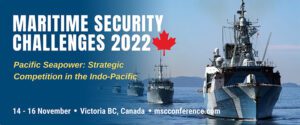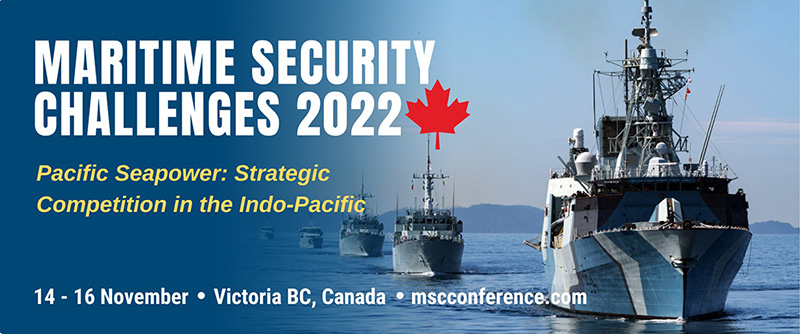
The biennial Maritime Security Challenges conference (MSC22) was held in Victoria, BC Canada from Nov. 14-16 under the theme of “Pacific Seapower: Strategic Competition in the Indo-Pacific.”
This year’s conference, which covered the subject of maritime security through a blend of academic theory and real-world current events, was hosted by The Navy League of Canada and The Royal Canadian Navy, with the Daniel K. Inouye Asia-Pacific Center for Security Studies as a partner.
The Honolulu-based Center for Security Studies is a U.S. Department of Defense institute that was launched in 1995. It addresses both regional and global issues with a mix of military and civilian representatives from the U.S. and Asia.
The conference’s first day began at noon with a familiarization event onboard the Kingston Class Canadian Forces patrol vessel HMCS Edmonton. There were also helicopter drills and small boat competitions.
Several discussion panels were a fixture at the event, as well as individual presentations on conference’s second and final days. The first panel on Nov. 15 was “Challenges to the Strategic Commons,” with the following two panels during the day being on the topics “Great Power Competition and the Spaces Between” and “New Old Theatres: Renewed Strategic Focus on the Pacific Islands.”
The first presentation on Nov. 16 was titled “Geopolitics, Security, and the Shipping Industry,” and featured Dr. Sal Mercogliano, an Associate Professor of History at Campbell University, who’s the host of the YouTube channel “What is Going on with Shipping?”
Panel discussions on the conference’s final day were on the topics “Innovation to Meet Maritime Challenges” and “Building the Fleets of Tomorrow.” Those were followed by a presentation by Royal Canadian Navy Lt. Cmdr. Ryan Bell on the topic “The Arctic and Offshore Patrol Ship: New Platform, New Operations.”
The conference’s final discussion panel of the conference was “5 Eyes Perspectives on the Indo-Pacific.” The Five Eyes (FVEY) is an alliance of intelligence resources from the United States, Canada, Australia, New Zealand and the United Kingdom. Representatives from all five countries participated in the panel.
Three of the FVEY countries held joint exercises this year in the South China Sea and Indo-Pacific, along with Japan.
As a biennial conference, the previous Maritime Security Challenges was scheduled to be held in 2020. However, due to the COVID-19 pandemic, it was held as a virtual event. Some of the presentations are available on the Maritime Security Challenges YouTube channel, as well as a couple of virtual webinars held late last year and this year.
The December 2021 event was hosted by Dr. Brian Chao, an assistant professor with the National Security Affairs College of the Naval War College in the U.S., who discussed China’s quest to compete in the naval arena with other great powers.
He gave some examples of other countries that have succeeded in having a strong army and navy, and others that weren’t as successful. He discussed how this was brought about with a country having both investment persistence and threat diffusion.
The most recent webinar was held in August and was hosted by Dr. Michael Petersen, an Associate Professor and Director of the Russian Maritime Studies Institute at the U.S. Naval War College.
He primarily discussed Russia’s war-fighting strategy, and also talked about what he called a “loss of strength gradient,” which is based on different zones in proximity to Russia. There is the “Near Sea” zone, which is coastal and farther out zones are the “Far-Sea” zone, and the “World Ocean” zone.
During the Q&A session, he noted that air defense while at sea is very difficult. There was also some discussion about a warming Arctic and how that might affect their strategy.
Initiated in 2005, the Maritime Security Challenges (MSC) conference series is the only conference of its kind in Canada. With international representation from military, government, academia and industry, the biennial event provides a unique opportunity to meet and discuss maritime security issues of common concern, and work towards shared solutions.
The MSC conference organizers are participants in the maritime security community and provide an arena that fosters learning, encourages the exchange of ideas, and enables opportunities to connect with colleagues from around the globe.

